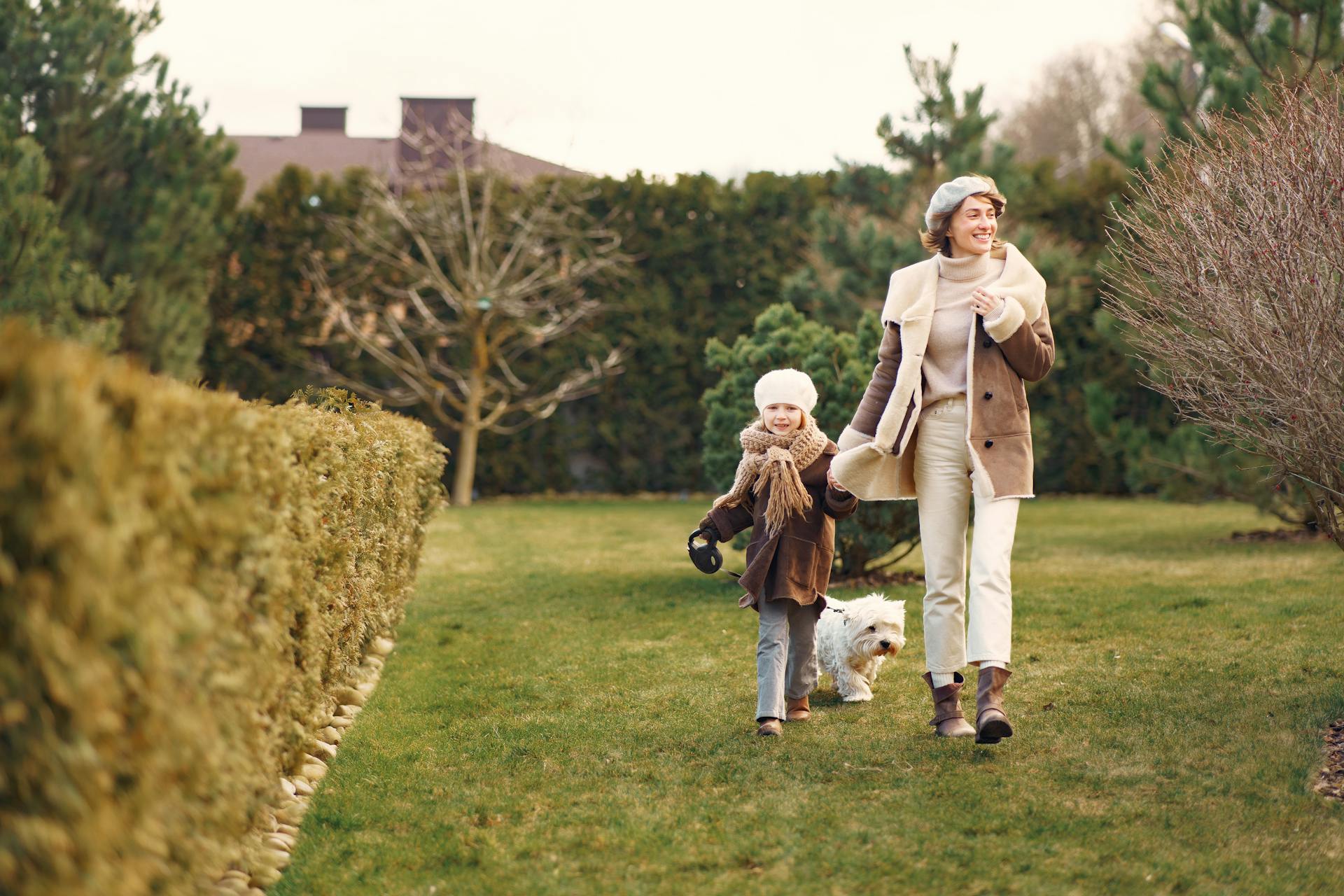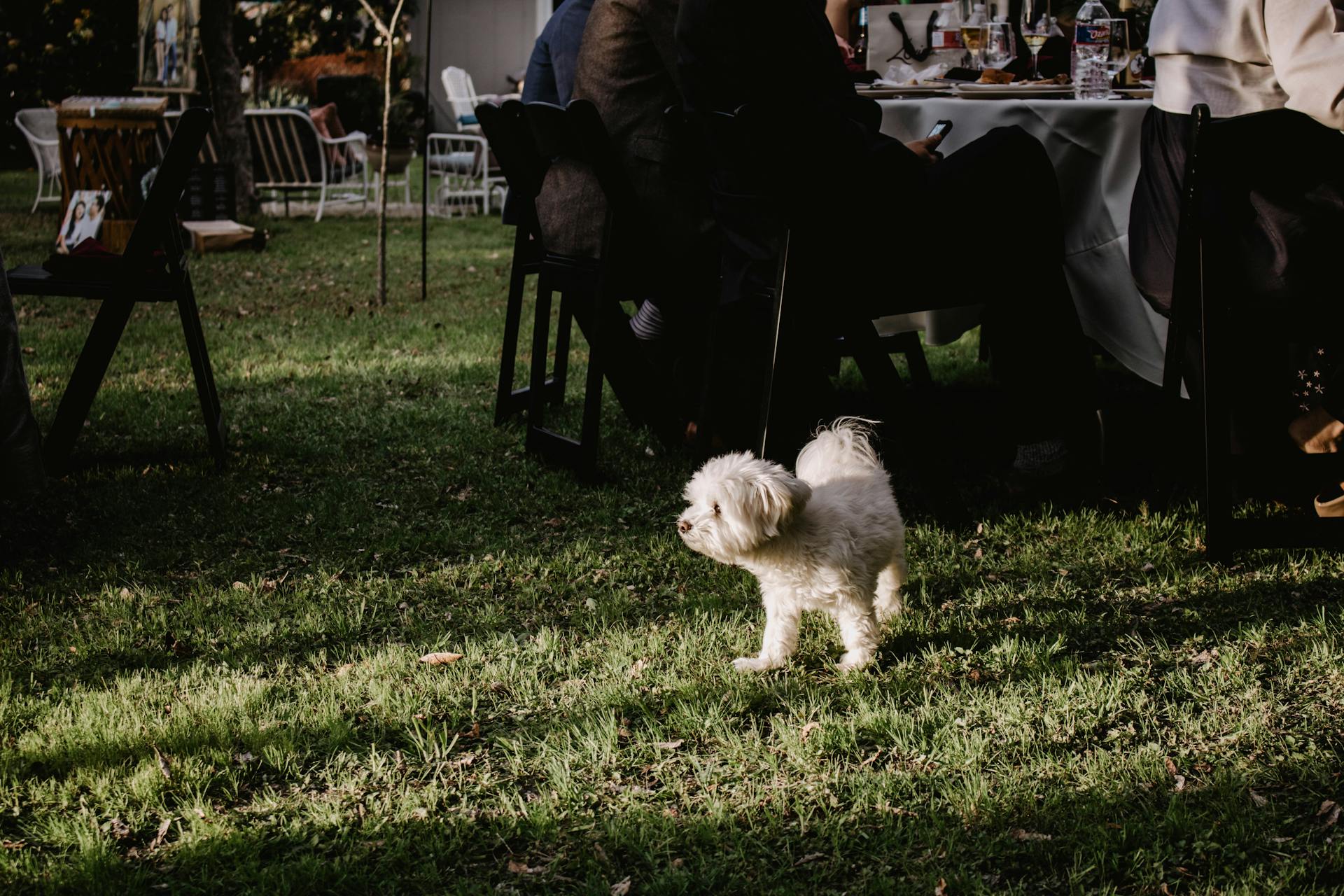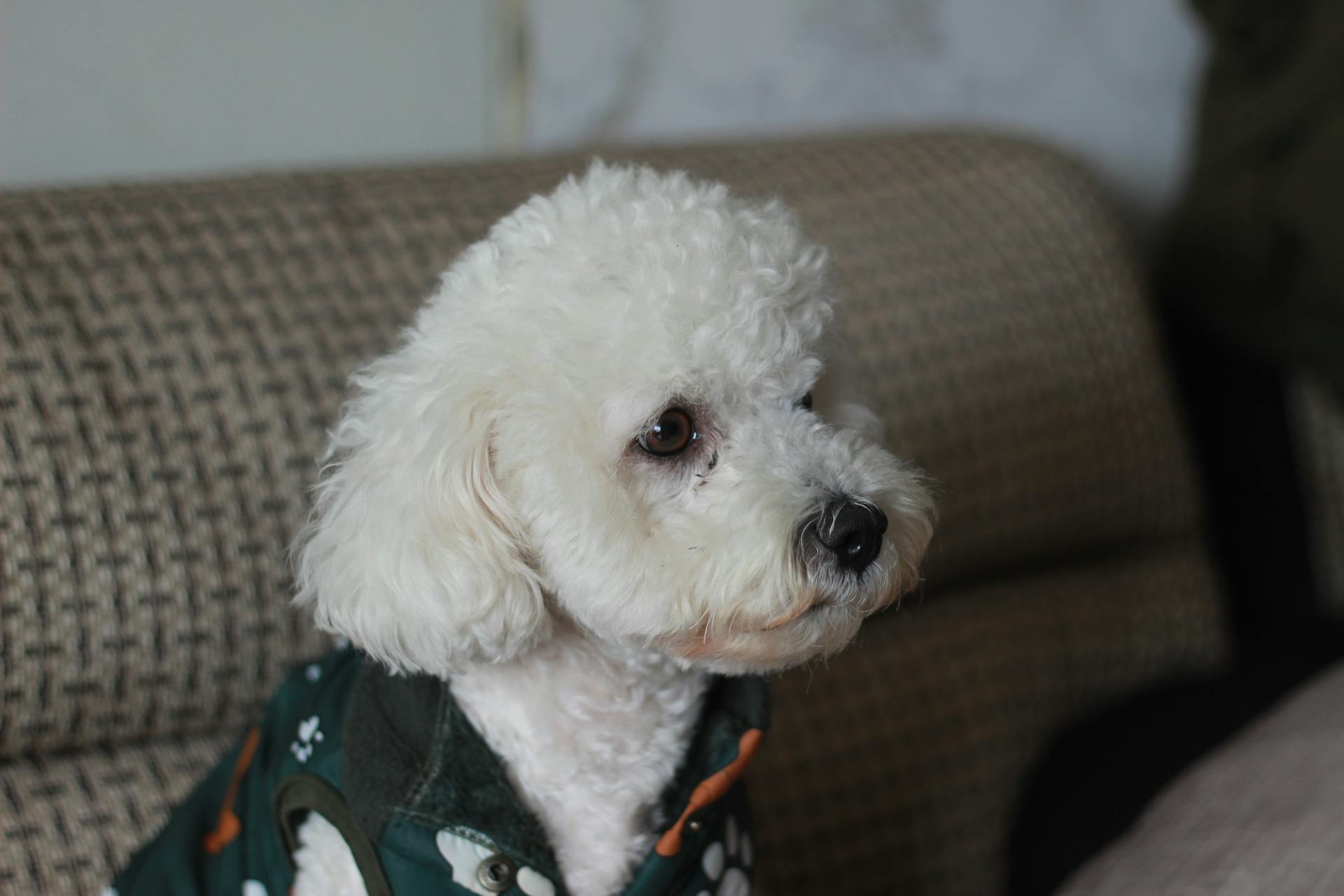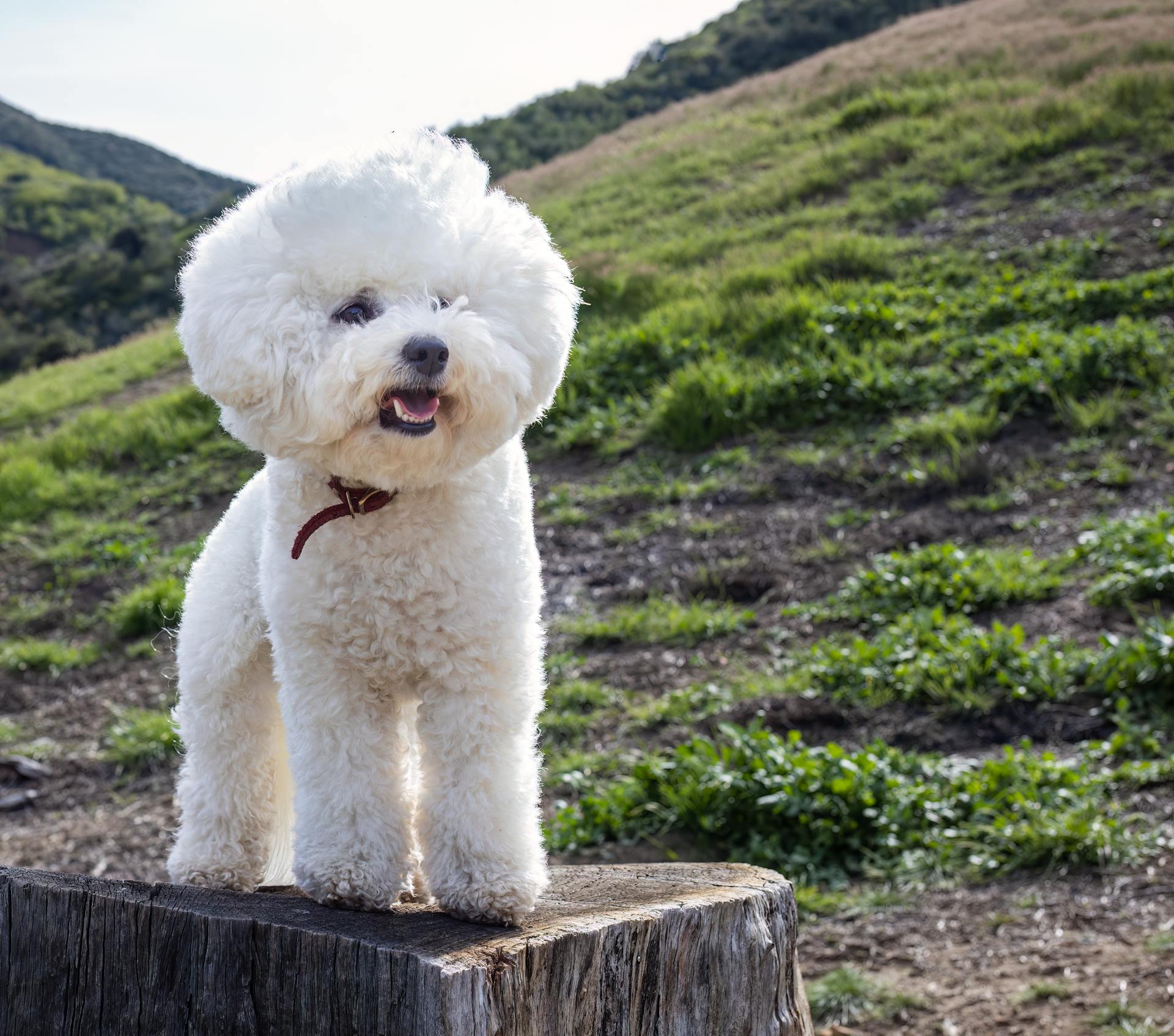
If you're considering bringing a new furry friend into your family, you're likely torn between two adorable breeds: the Bichon Frise and the Havanese. Both are playful, gentle, and affectionate dogs that make great companions.
One key difference between the two breeds is their grooming needs. Bichon Frises require daily brushing to prevent matting and tangling, while Havanese dogs need regular brushing but can get away with less frequent grooming sessions.
In terms of size, Bichon Frises typically weigh between 7-12 pounds and stand about 9-12 inches tall, while Havanese dogs weigh between 7-13 pounds and stand about 8-11 inches tall. This means that both breeds are small enough to fit comfortably in apartments or homes with small yards.
Ultimately, the decision between a Bichon Frise and a Havanese comes down to your personal preferences and lifestyle.
A different take: Small Breed Bichon Frise
Temperament
Bichon Frises are known for their cheerful, upbeat, and curious personalities, making them great family dogs. They're also playful, gentle, and sensitive, which means they're perfect for families with kids.
One of the key characteristics of Bichon Frises is their strong bond with their humans. They tend to get anxious if left alone for long periods, which can lead to undesirable behaviors. So, if you're considering getting a Bichon Frise, be prepared to spend quality time with them.
Here's a comparison of the temperament of Bichon Frises and Havanese dogs:
As you can see, both breeds share many similarities when it comes to temperament. But what really sets Bichon Frises apart is their Velcro-like nature - they love to be close to their humans and can get anxious if left alone for too long.
Training and Intelligence
Bichons are intelligent and eager to please, making them take to training quite easily. However, they do have one area of difficulty: housebreaking. Consistency and gentleness are key to success in this area.
Bichons are known to enjoy performing tricks and can learn new ones quickly, responding best to positive training methods using rewards and praise.
A Bichon Frise is considered quite easy to train, while a Havanese is very easy to train, making them both great options for first-time dog owners.
Here's a comparison of the trainability of Bichon Frise and Havanese:
Health and Wellbeing
Both Bichon Frise and Havanese breeds are generally healthy, but they can be prone to certain health issues. The Bichon Frise is susceptible to allergies, hip dysplasia, patellar luxation, vaccination sensitivity, bladder stones, and juvenile cataracts.
The Havanese breed, on the other hand, is more prone to cataracts, heart murmurs, hip dysplasia, Legg-Perthes disease, patellar luxation, deafness, chondrodysplasia, elbow dysplasia, mitral valve disease, and portosystemic liver shunt.
Regular veterinary visits are crucial for both breeds, with an average of one complete physical check-up per year recommended for each.
For more insights, see: Havanese Cross Breeds
Health and Lifespan
Both the Bichon Frise and Havanese are generally healthy breeds, but they can be prone to certain health issues. These include hip dysplasia, patellar luxation, allergies, vaccination sensitivity, bladder stones, and juvenile cataracts in the Bichon Frise, and cataracts, heart murmurs, hip dysplasia, Legg-Perthes disease, patellar luxation, deafness, chondrodysplasia, elbow dysplasia, and mitral valve disease in the Havanese.
Regular veterinary visits are essential to monitor their health and catch any potential issues early. Both breeds should have a complete physical check-up at least once per year.
Readers also liked: Problems with Havanese Dogs
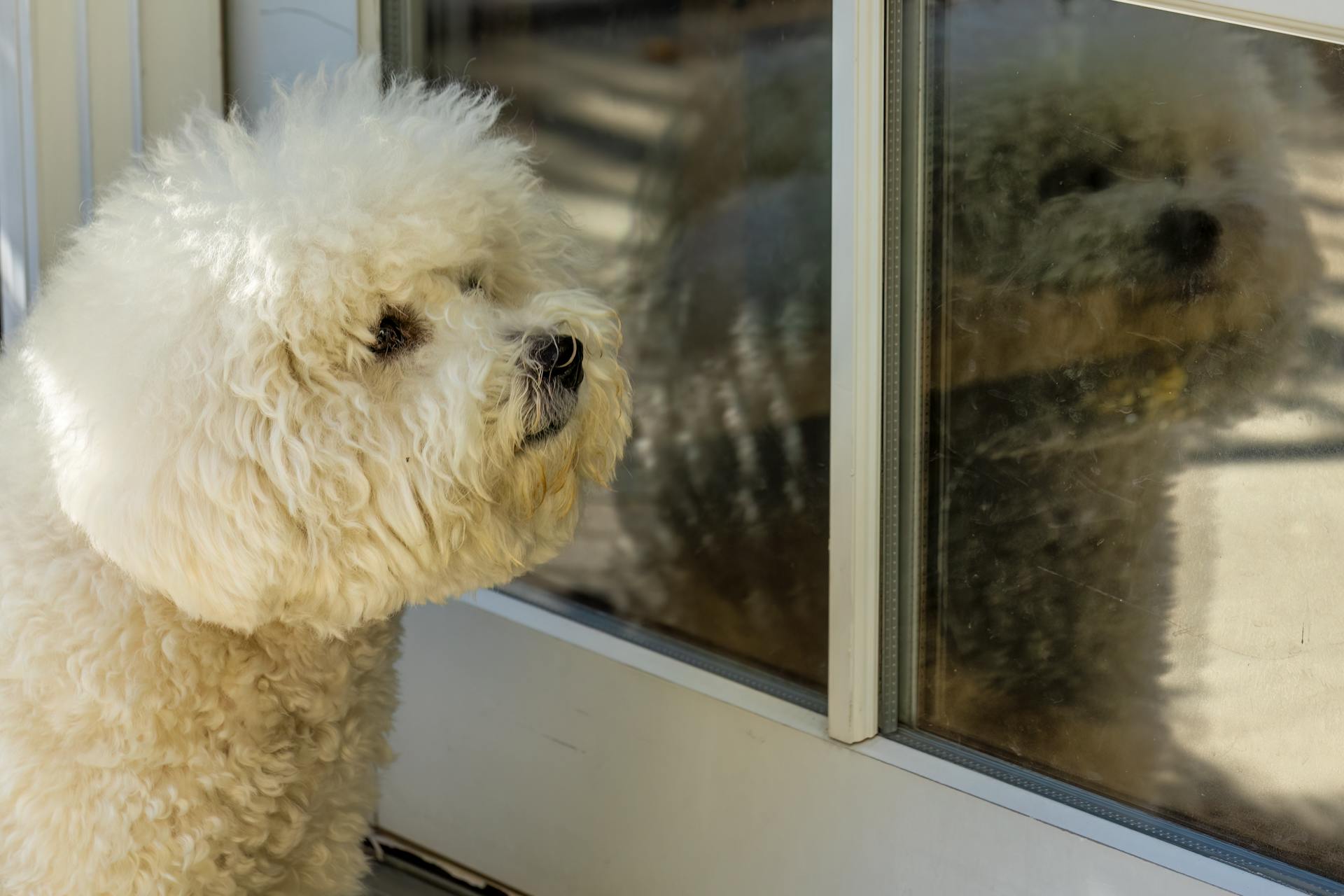
The average lifespan of a Bichon Frise is 13 years, while the Havanese lives for around 15 years on average. This means that the Havanese has a slightly longer lifespan than the Bichon Frise.
Here's a comparison of the health issues that can affect both breeds:
It's essential to be aware of these potential health issues and work with a reputable breeder to reduce the risk of inherited conditions.
Reproducibility
Reproducibility is a crucial aspect of a dog's health and wellbeing. Responsible breeding practices are essential to ensure the health and happiness of both the mother and her puppies.
A Bichon Frise's gestation period lasts for 60-64 days, which is the same for a Havanese. This relatively short period requires careful planning and consideration.
More frequent breeding is not healthy for either breed, so it's essential to plan for a litter only once a year.
Here's a comparison of litter sizes for Bichon Frises and Havanese:
Check this out: Breeding Bichon Frise
Diet and Exercise
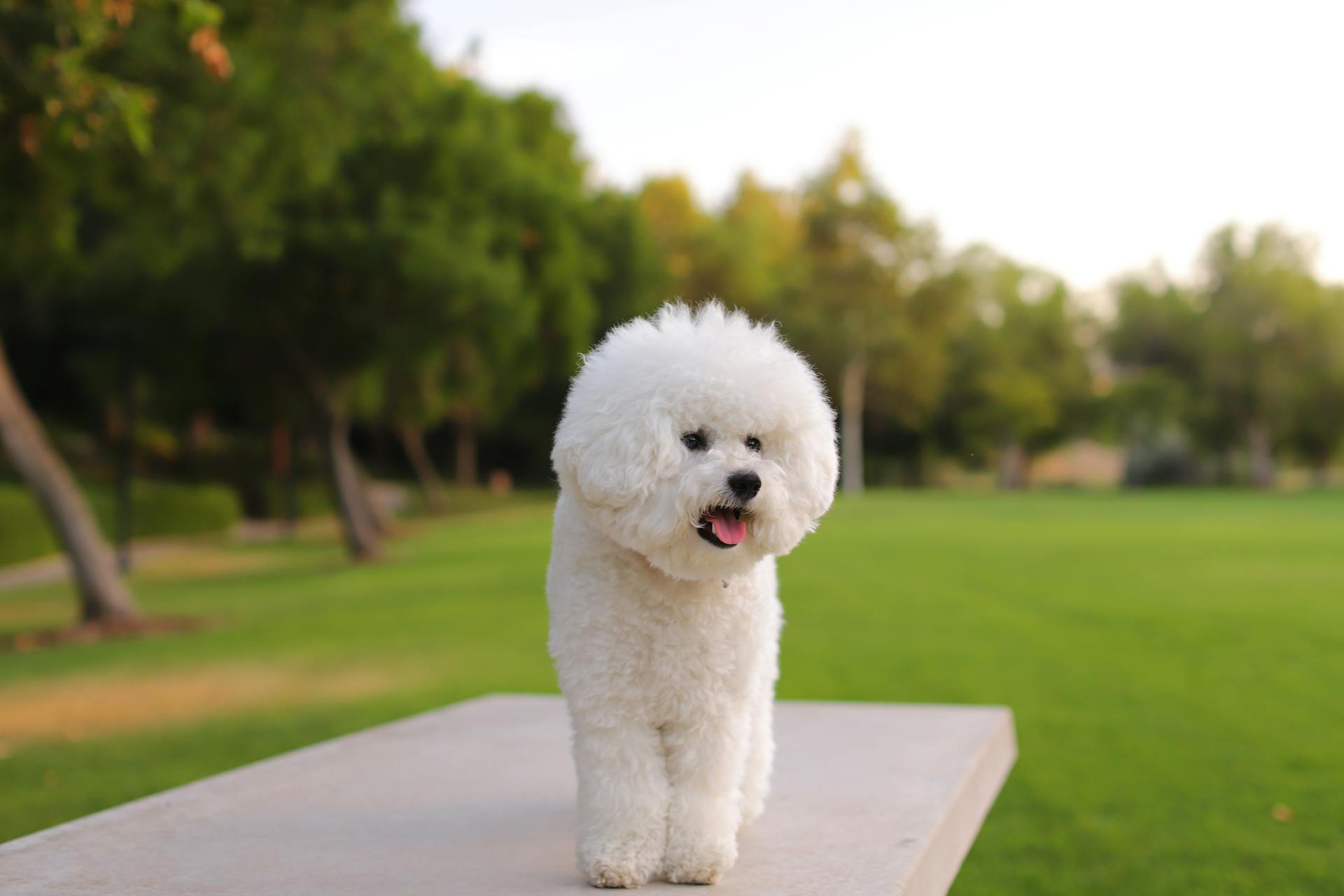
Both Bichon Frises and Havanese dogs require regular feeding to maintain a healthy weight.
The daily food consumption for Bichon Frises is 1/2 to 1.5 cups of high-quality dry food a day, divided into two meals.
For Havanese dogs, the daily food consumption is slightly lower, at 1/2 to 1 cup dry food a day.
To prevent weight gain and obesity, both breeds need regular exercise and monitoring of their food intake.
If this caught your attention, see: Havanese Feeding Chart
Diet and Weight Management
When managing your furry friend's diet and weight, it's essential to understand their specific needs. The Bichon Frise and Havanese breeds require attention to their food intake to avoid weight gain.
Both Bichon Frise and Havanese dogs need to be fed high-quality dry food, but the Bichon Frise requires a bit more, consuming 1/2 to 1.5 cups per day, divided into two meals.
Their small size can be deceiving, as both breeds are prone to obesity if not monitored. If you don't pay attention to their weight, they can easily gain weight, with a weight gain potential rating of Average to High.
Worth a look: Are Havanese Dogs High Maintenance
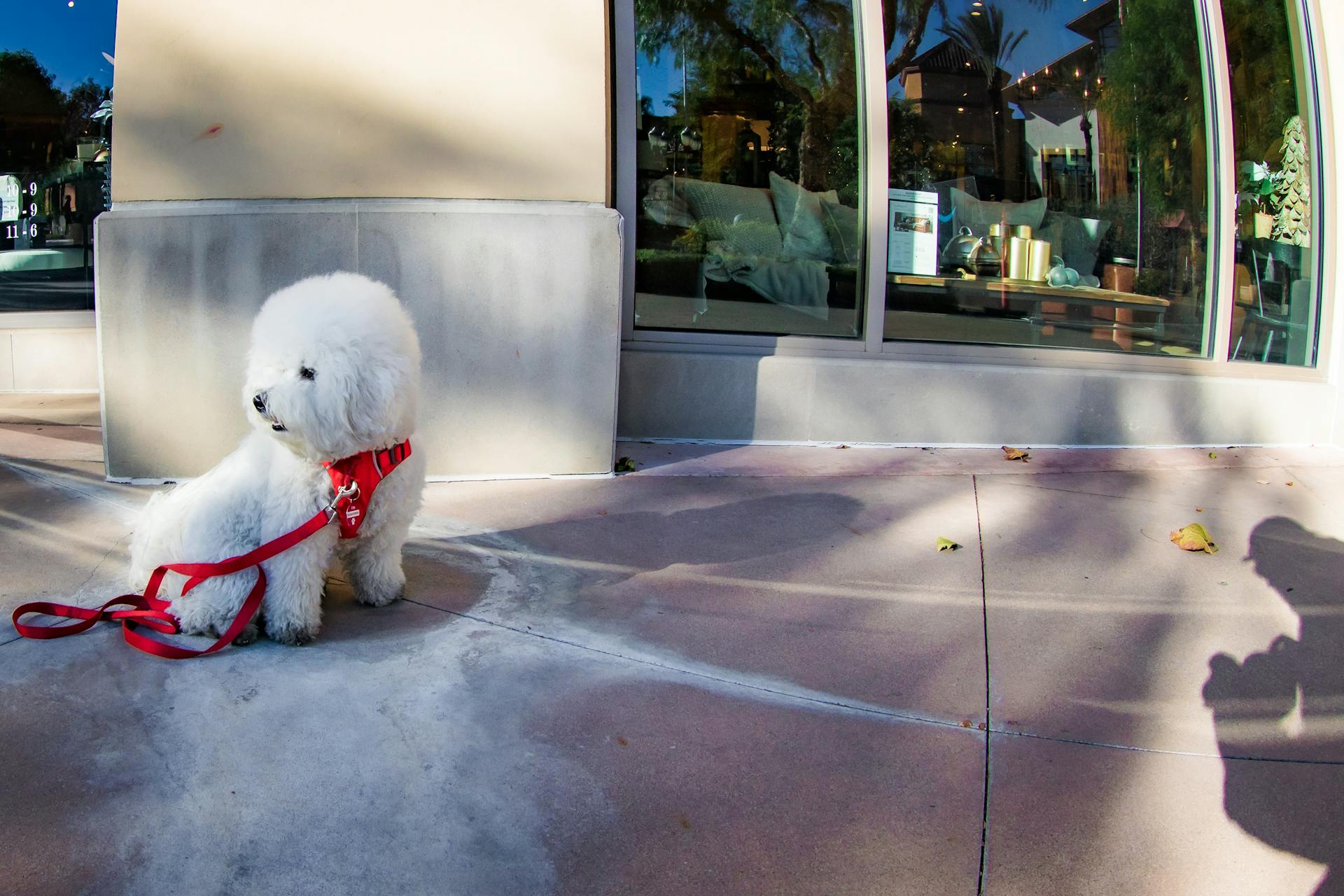
Here's a comparison of their daily food consumption:
By being aware of these specific needs, you can take steps to ensure your furry friend stays healthy and happy.
Energy and Activity
When it comes to energy and activity, both Bichon Frise and Havanese breeds have their own unique characteristics.
The Bichon Frise has a lower energy level than other dogs, which means they don't require as much physical activity to stay happy and healthy.
Bichon Frise dogs exercise need is minimal, so short walks and playtime should suffice. They also like sleeping a lot, so be prepared for a snuggle buddy who's always ready for a nap.
On the other hand, the Havanese has an average energy level, making them a great choice for semi-active owners who can keep up with their playful nature.
Havanese dogs exercise need is very minimal, which means they're happy with short bursts of activity and plenty of rest time.
Explore further: Short Haired Havanese
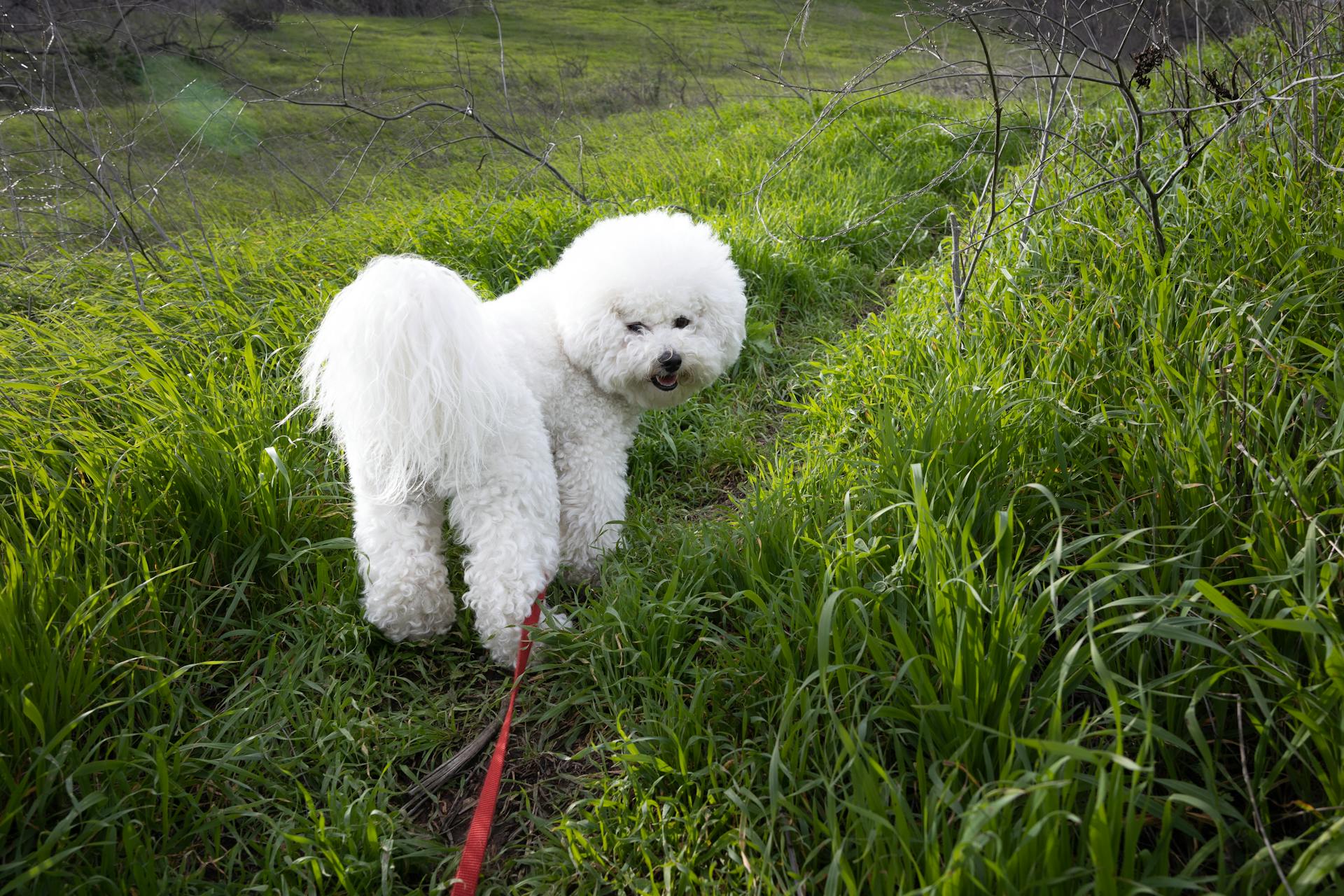
Both breeds are very house-friendly, making them perfect for apartment living where space is limited.
Here's a quick comparison of the two breeds' energy and activity levels:
Overall, both breeds are adaptable and can thrive in a variety of living situations, as long as they receive the right amount of love, care, and attention.
Good to Know
Both Bichon Frise and Havanese dogs are extremely friendly, making them a great choice for families with kids. They're also very cat-friendly, so if you have multiple pets at home, these breeds are a great option.
If you're considering getting one of these breeds as a first-time owner, you'll be happy to know that both Bichon Frise and Havanese dogs are easy-going and perfect for novice owners.
Here's a quick rundown of some key characteristics to consider:
Both breeds are great with kids, but if you're an elderly person, either breed would make a wonderful companion.
Parent Breeds Are Closely Related
The Havachon's parent breeds are quite fascinating.
Bichon Frises and Havanese dogs both descend from the same common ancestors, little white dogs of the Bichon family.
This shared ancestry is one reason why Havachons often inherit the playful and affectionate traits of their parent breeds.
Both parent breeds, Bichon Frises and Havanese, also tend to be social and intelligent, which makes them a great match for families or individuals who want a loyal companion.
Their close relationship as parent breeds means that Havachons often require consistent training and socialization to become well-behaved dogs.
Choosing the Right Breed
If you're looking for a dog that's friendly to strangers, both Bichon Frise and Havanese breeds are great options, but Bichon Frise dogs are particularly good with strangers.
Both breeds are also very kid-friendly, making them a great choice for families with children. They're also very cat-friendly, so if you have a feline companion at home, don't worry about introducing a new dog to the family.
When it comes to dog-friendly, both breeds get along well with other dogs, making them a great choice if you have multiple pets at home.
Here's a comparison of the two breeds:
Both breeds are also good for novice owners, due to their easy-going personalities, making them a great choice for first-time dog owners.
A different take: Are Bichon Frise Good for First Time Owners
Recognition
The American Kennel Club (AKC) recognizes the Bichon Frise as a Non-Sporting breed, having done so in 1972. The Havanese, on the other hand, was recognized by the AKC in 1996 as a Toy breed.
The FCI, or Federation Cynologique Internationale, does not recognize the Bichon Frise, but the Havanese is recognized by them in the Companion and Toy Dogs group.
Both breeds are recognized by a wide range of organizations, including the American Canine Registry, American Kennel Club, and the United Kennel Club, among others.
Here's a list of some of the organizations that recognize these breeds:
Havachon Variations
The Havachon is known by several names, and it's not uncommon to see them referred to as Frise Havanese.
You may also see them called Bichonhavanese, which is another combination of their parent breed's names.
The Havachon's multiple names can make it confusing, but they're all referring to the same adorable and friendly dog.
Intriguing read: Bichon Dog Names
Frequently Asked Questions
What two dog breeds make a Havanese?
The Havanese breed is believed to have originated from the cross-breeding of the Blanquito and the poodle. This unique combination of breeds resulted in the Havanese's distinctive characteristics and traits.
Featured Images: pexels.com
